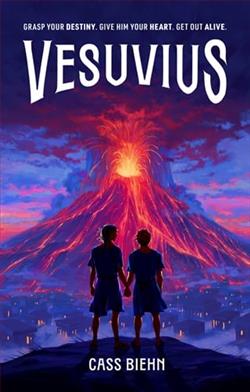Martial Peak Reviews
Cass Biehn's Vesuvius is a captivating blend of historical fiction, mythology, and romance that transports readers to the bustling streets of ancient Pompeii, on the brink of its catastrophic demise. The novel's premise is intriguing: a clever thief named Felix inadvertently becomes entangled in a web of divine relics and prophetic dreams, setting the stage for a thrilling narrative that explores themes of destiny, memory, and love.
At the heart of Vesuvius is the character of Felix, a thief whose life is defined by his cunning and resourcefulness. Felix's character is richly developed, with Biehn skillfully peeling back layers of his past as the story unfolds. The helmet he steals is not merely a plot device but a catalyst for his transformation. When Felix touches the helmet, it triggers memories of a forgotten past, adding depth to his character and creating a compelling mystery that propels the narrative forward. Felix's journey is one of self-discovery, as he grapples with the implications of his past and the role he must play in the impending disaster.
In contrast, Loren is an aspiring councilman and temple attendant, whose life is governed by duty and ambition. Loren's character is equally well-crafted, with his prophetic nightmares serving as a poignant reminder of the fragility of life in ancient Pompeii. These nightmares, which feature Felix, add a layer of tension and urgency to the story, as Loren becomes increasingly aware of the city's impending doom. Loren's internal conflict between his responsibilities and his growing feelings for Felix adds emotional depth to the narrative, making their relationship a central focus of the story.
The relationship between Felix and Loren is a beautifully woven tapestry of tension, trust, and tenderness. Biehn deftly explores their evolving bond, highlighting the challenges they face in a world ruled by "bloody politics and unstoppable destinies." Their romance is not merely a subplot but an integral part of the narrative, providing a glimmer of hope amidst the chaos of Pompeii's impending destruction. The chemistry between Felix and Loren is palpable, and their interactions are infused with a sense of urgency and vulnerability that is both poignant and compelling.
One of the novel's standout features is its vivid depiction of ancient Pompeii. Biehn's meticulous attention to detail brings the city to life, from the bustling marketplaces to the opulent villas of the patricians. The author's evocative prose captures the vibrancy and diversity of Pompeii, immersing readers in a world that is both familiar and foreign. This rich historical backdrop serves as a stark contrast to the looming threat of Mount Vesuvius, creating a sense of impending doom that permeates the narrative.
Thematically, Vesuvius delves into the concept of fate and free will, exploring how the characters navigate their destinies in a world where the gods hold sway. The relic of Mercury's helmet serves as a symbol of the divine influence in their lives, challenging Felix and Loren to confront their pasts and shape their futures. Biehn's exploration of these themes is nuanced and thought-provoking, prompting readers to consider the extent to which our lives are governed by forces beyond our control.
In terms of pacing, the novel strikes a delicate balance between action and introspection. The narrative is punctuated by moments of intense drama, such as the earthquakes that rock the city and the political machinations of the patricians. These scenes are expertly crafted, heightening the tension and driving the plot forward. At the same time, Biehn allows for moments of quiet reflection, giving the characters space to grapple with their emotions and the weight of their decisions.
Comparatively, Vesuvius shares thematic similarities with other historical novels that blend romance and mythology, such as Madeline Miller's The Song of Achilles and Mary Renault's The King Must Die. Like these works, Biehn's novel explores the intersection of human emotion and divine intervention, creating a narrative that is both epic in scope and intimate in its portrayal of love and loss.
Overall, Cass Biehn's Vesuvius is a masterful work of historical fiction that captivates with its rich character development, evocative setting, and exploration of timeless themes. The novel's blend of romance, mythology, and history creates a compelling narrative that resonates long after the final page is turned. For readers seeking a story that is both thrilling and thought-provoking, Vesuvius is a must-read.





![A Killer Paradox [Official]](/upload/pic/manga/a-killer-paradox--official-.jpg)


















Reviews 0
Post a Reviews: